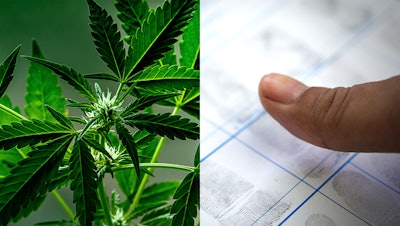
Delaware’s plan to commence adult-use cannabis sales is moving forward once again after getting sidetracked by a federal-state misalignment, yet a technical issue still exists.
The state’s Office of the Marijuana Commissioner (OMC) announced May 5 that it received a fingerprint service code from the Federal Bureau of Investigation (FBI) to perform required background checks on those applying for adult-use business licenses.
In late March, the OMC had informed the public that the FBI had rejected its revised application for the services code to initiate Delaware’s statutorily required criminal history reports on individuals aspiring to enter the forthcoming marketplace. The FBI had notified state cannabis regulators that Title 4 of the Delaware Code was too vague regarding who would be required to obtain the background checks.
Delaware lawmakers filed a legislative fix, House Bill 110, on April 3 to align the state code with FBI standards. Gov. Matt Meyer signed the bill on April 24, allowing the OMC to return to the FBI with revised language for the service code.
The OMC announced Monday that the FBI partially approved the revised language and issued the fingerprinting code for selected applicants.
“Fingerprint-based background checks are a vital part of ensuring public safety and maintaining the integrity of the program,” OMC Acting Marijuana Commissioner Paul Hyland said. “We appreciate the FBI’s collaboration and are excited that selected applicants can continue moving forward.”
While the OMC will contact selected applicants this week with the next steps in the process, the state’s cannabis regulators also have to return to the General Assembly to resolve a still existing “technical” issue. The FBI rejected the term “agent” as being overly broad in the Title 4 code’s revised language.
Those required to complete the background checks include:
- An applicant for a cannabis establishment license;
- A person who performs work at or for a cannabis establishment, whether classified as a contractor, employee or volunteer, with or without compensation, and prior to beginning work;
- A person who is or seeks to become a director, officer, board member or agent of a licensed cannabis establishment or a business entity that is an applicant for a cannabis establishment license; and
- A person who holds an ownership interest of 10% or more in a licensed cannabis establishment or a business entity that is an applicant for a cannabis establishment license.
Delaware Rep. Ed Osienski, D-Newark, who sponsored the state’s push for adult-use legalization as well as H.B. 110, said in a public statement May 5 that he appreciated his fellow lawmakers and the governor for working expeditiously to support his legislative fix for the service code.
“This means we’re one step closer to getting the legal adult-use cannabis industry up and running,” he said. “Delawareans have waited long enough for a safe, legal adult-use market, and I’m glad to see that implementation is getting back on track.
“I also want to recognize the many entrepreneurs, especially from communities that have long been left behind, who have already invested a significant amount of time and resources into the industry. They’ve waited patiently, and I’m hopeful they’ll soon be able to open their doors, create jobs, and help build a strong, well-regulated market.”
The setback from the FBI came two years after former Gov. John Carney allowed complementary adult-use legalization bills to go into effect without his signature in April 2023.
The OMC had tentatively planned to commence the adult-use marketplace in March 2025 under former Marijuana Commissioner Rob Coupe, who resigned in January after the office held lotteries to award 125 conditional adult-use licenses in late 2024.
State regulators can’t formally issue those licenses—to 60 cultivators, 30 manufacturers, 30 retailers and five testing laboratories—until the background checks are performed.
“Delaware’s recreational cannabis industry is going to create good-paying jobs and provide critical revenue for the state to help pay for schools, housing and health care,” Meyer said last month when he signed H.B. 110 into law.
The state expects tens of millions of dollars in annual revenue from a 15% excise tax imposed on adult-use cannabis sales, with part of that revenue going toward funding justice reinvestment initiatives.



























